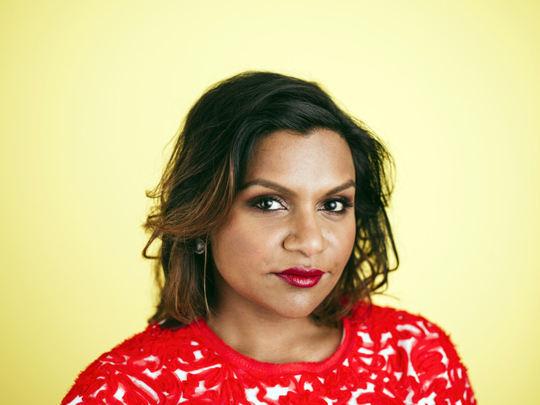
“Let’s go over my plan, shall we?” said Mindy Kaling into my ear. I was halfway into her second audiobook, Why Not Me?, and Kaling was describing her expectations for the show she was developing.
“My natural assumption was that NBC would put my new show on the air as part of a revitalised ‘Must See TV’ and make 200 classic episodes — no lazy clip shows — finishing with a 90-minute finale that everyone agreed was a sweet and satisfying send-off,” she said. “I would emerge from the show’s legacy as a modern version of Larry David and Mary Tyler Moore, retiring to a tasteful mega-compound on Martha’s Vineyard, where I would write plays and drink wine with Ted Danson and Mary Steenburgen at least several times a week.”
The only thing her elaborate daydream didn’t prepare her for? “The slightest setback.”
Kaling’s books, Is Everyone Hanging Out Without Me? (And Other Concerns), released in 2011, and Why Not Me? from 2015, aren’t self-help, but her anecdotes and advice helped ease much of my anxiety as a young professional woman of colour.
Is Everyone Hanging Out came out while Kaling was still playing Kelly Kapoor on The Office and includes reflections on her childhood and her early 20s, when she was still living in New York, trying to break into television. Why Not Me? is more emotionally candid; Kaling laments that, in her 30s, she often goes to weddings, which she hates (“when you are a bridesmaid, you are required to be a literal maid for the duration of the wedding”), just to see her friends.
In another chapter, she explains her “weird as hell” relationship with B.J. Novak; “B.J. and I are soup snakes,” she said, an Office reference to a gaffe by Michael Scott, who misreads “soul mates” in his handwritten note to his love interest, Holly.
I burst out laughing when I heard Kaling rattle off the details of her wildly idealistic predictions.
You’ve got to adapt.
Real-life trajectories are rarely as neat as the ones you map in your head. NBC, which aired The Office and had long been Kaling’s dream network, passed on her project. “It’s weird when you feel your dream slipping away from you,” said Kaling, adding the quip, “Especially when you have no other dreams.”
When I started applying for jobs, I landed an interview at my dream magazine. For the first time, I was confident in my edit test, because I knew the publication, which caters to a diverse demographic, would see value in my ideas. After meeting with the editors, I was convinced I’d get the job; even more, I thought it was the only job in media I might have a chance of getting. But they didn’t hire me. I had a fixed view of my career, so the deviation felt like a setback.
I ended up at Glamour; Kaling’s show, on Fox, and later in Why Not Me?, after experiencing the whiplash of seeing The Mindy Project cancelled and immediately picked up by Hulu, Kaling emphasised the importance of adaptability. She said that’s all show business was: “transitioning panics,” from losing a job to having more work than you can handle; from being afraid your dreams won’t come true to realising they’ve changed.
Want confidence? Earn it.
In Why Not Me?, Kaling also addressed ambition and her conflicting feelings about wanting to leave The Office. “I had a dream job; was I ungrateful to wonder what more there might be for me? Or complacent if I didn’t?” she asked. “And who was I to try to seek anything better?”
Kaling joked that she was finally experiencing “white people problems,” because of the privileged position she was in, but her feelings echo the struggle of many women of colour in all-white spaces: to convince themselves they’re worthy of their dreams when their environment and society says otherwise. I struggle with this, too, and a recent study found that for people of colour, the effects of impostor syndrome — feeling like a fraud in your field despite high achievement — are compounded with discrimination or a lack of representation in the workplace. These factors combined cause higher levels of anxiety and “discrimination-related depression.”
Kaling advises on dealing with impostor syndrome in the last chapter of Why Not Me? She recalls a Q-and-A in Manhattan a year earlier, when a young Indian girl asked her where she gets her confidence from and Kaling gave a lackluster reply. She reconsiders here, for the sake of “that girl who went out of her way to be vulnerable in front of so many people.”
“Confidence is just entitlement,” she said, adding that, though the word has gotten a bad rap, “Entitlement is simply the belief that you deserve something.”
Kaling’s advice is to earn your confidence by studying your craft and working hard; “I’m usually hyper-prepared for whatever I set my mind to do,” she said, “which makes me feel deserving of attention and professional success.”
Finally, claim your dreams.
Though in the introduction of Is Everyone Hanging Out, Kaling said she is only “marginally qualified to give advice,” I disagree. It was fun listening to her precipitate the events of her life in her essays. In Is Everyone Hanging Out she mentions the Ocean’s franchise when listing movies she’d like to reboot; she co-stars in the women-led version of Ocean’s 8. In Why Not Me?, she said that she hopes her next book will be about starting a family, as well as her “awesome movie career.” She now has a daughter, Katherine.
Her books teach, in a nutshell, that “it’s cool to want more,” and have helped me stop questioning whether the life I envision for myself is too improbable or far away. Her life is proof that I just might get there.












